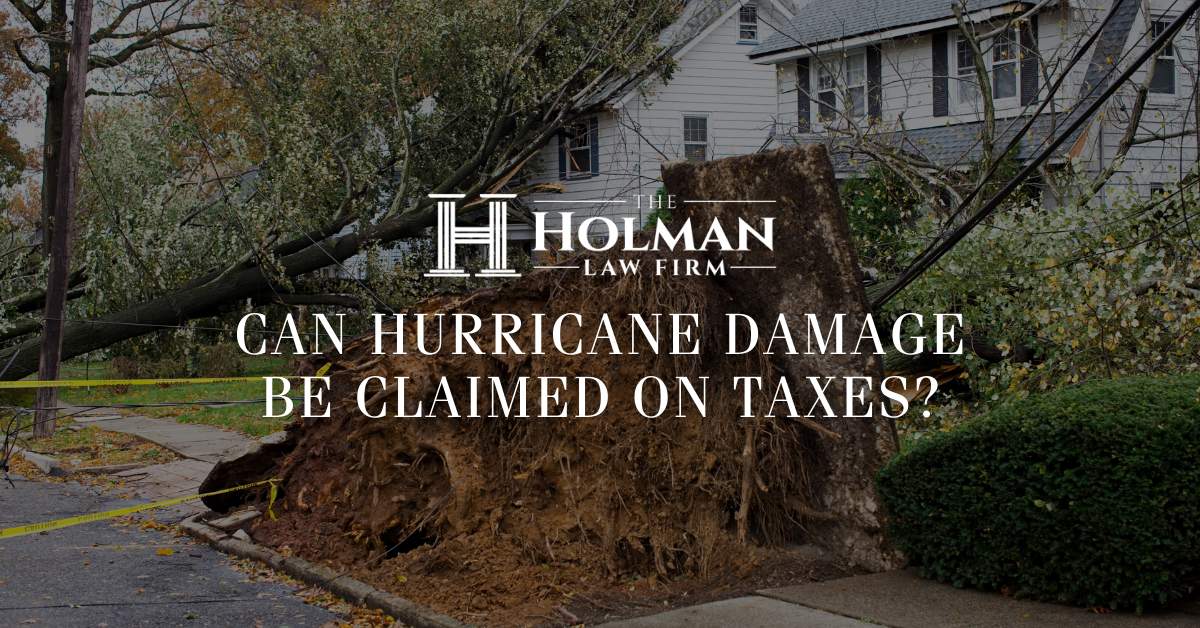Hurricanes are devastating, and the damage they cause can be costly, but the IRS allows taxpayers to deduct some of those losses from their taxes. Our experts at Holman Law Firm break storm damage claims (and more) down for you!
Here’s what you need to know about hurricane damage tax deductions.
If you live on the Gulf Coast, then most likely, you’ve experienced a hurricane. You may have even suffered losses and damages from major storms. If this is the case, then you can claim a deduction under certain circumstances.
You can only claim a deduction for damage to your home or personal property. However, if part of your personal property is damaged while you are away from home—for example, at an office or storage facility—you still must figure out whether any part of the loss is due to an insured cause, such as fire, theft or vandalism; windstorm; hail; earthquake; snowstorm; flood; explosion (not resulting from negligence); volcanic eruption (not resulting from negligence); tsunami waves caused by an earthquake or volcanic eruption (not resulting from negligence); tornado not otherwise insured under this policy; terrorism not otherwise insured under this policy.
The storm damage deduction does not apply to business properties, rental properties or real estate that has been condemned or destroyed by the storm.
If your home is damaged by the storm and you have a mortgage on it, your lender may allow you to deduct the interest costs of repairing your home. This will only happen if they agree that your loss was caused by the hurricane. If they don’t agree with this deduction, then their tax refund will be reduced accordingly.
You have to have a record of the loss.
Keep receipts for everything. You may be able to deduct your hurricane-related expenses if they were necessary and reasonable, but the IRS requires that you have a record of each expense, including:
- Repair expenses or losses (such as lost rent or depreciation)
- Insurance payments (including any amounts withheld from disaster relief payments)
Insurance proceeds don’t count against casualty loss deductions.
If you declare a casualty loss and have insurance proceeds, the Internal Revenue Service will not tax those payments. Insurance can pay for the loss of personal property, but not the home itself. However, you can deduct repairing or replacing your car or other personal items that were damaged in the storm.
Theft is considered a casualty loss by the IRS and can be claimed on taxes.
Theft is a casualty loss. The IRS defines casualty losses as “losses caused by sudden, unexpected or unusual circumstances that are beyond your control.” Theft is an example of a casualty loss because it was sudden, unexpected and outside of your control to prevent. However, there are still some guidelines for claiming theft on taxes that you need to be aware of:
- Theft must result in more than $100 in total losses for it to qualify as an eligible deduction on your tax return. The IRS will not allow you to claim theft if the amount stolen from you is less than $100 unless there were other mitigating factors involved such as identity theft or damage caused by a natural disaster (such as fire or flood).
- You cannot claim theft if it resulted from another person’s negligence or carelessness (i.e., someone accidentally left their wallet unattended at a restaurant).
The tax rules around hurricane damage are complicated, so be sure you do your research before filing your taxes after a storm hits.
If you suffered hurricane damage this year, the tax rules around disaster relief are complicated. The IRS usually requires taxpayers to itemize their deductions in order to write off any losses from a storm.
In general, if your home or property was damaged by a storm this year and you’re not able to get financial assistance through FEMA or other government agencies, you may be able to deduct the cost of repairs on your taxes. In addition, if your car was damaged during a storm and had no insurance coverage for wind-related damage (or if the car itself was completely destroyed), then those costs could also be deductible items on your taxes.
However: there is no guarantee that these expenses will qualify as legitimate tax deductions—so before filing this spring make sure that everything is documented well enough so you don’t end up with an audit at worst or an unnecessary reduction in your take-home pay at best!
We hope this information helps you understand how to claim hurricane damage on taxes. Remember that the tax rules are complicated, so be sure to do your research before filing your taxes after a storm hits. If you have any questions about these topics or would like more information on how we can help with tax preparation, please contact us today!
Services We Offer:
Family Law | Child Custody | Divorce | Personal Injury | Auto Accidents



